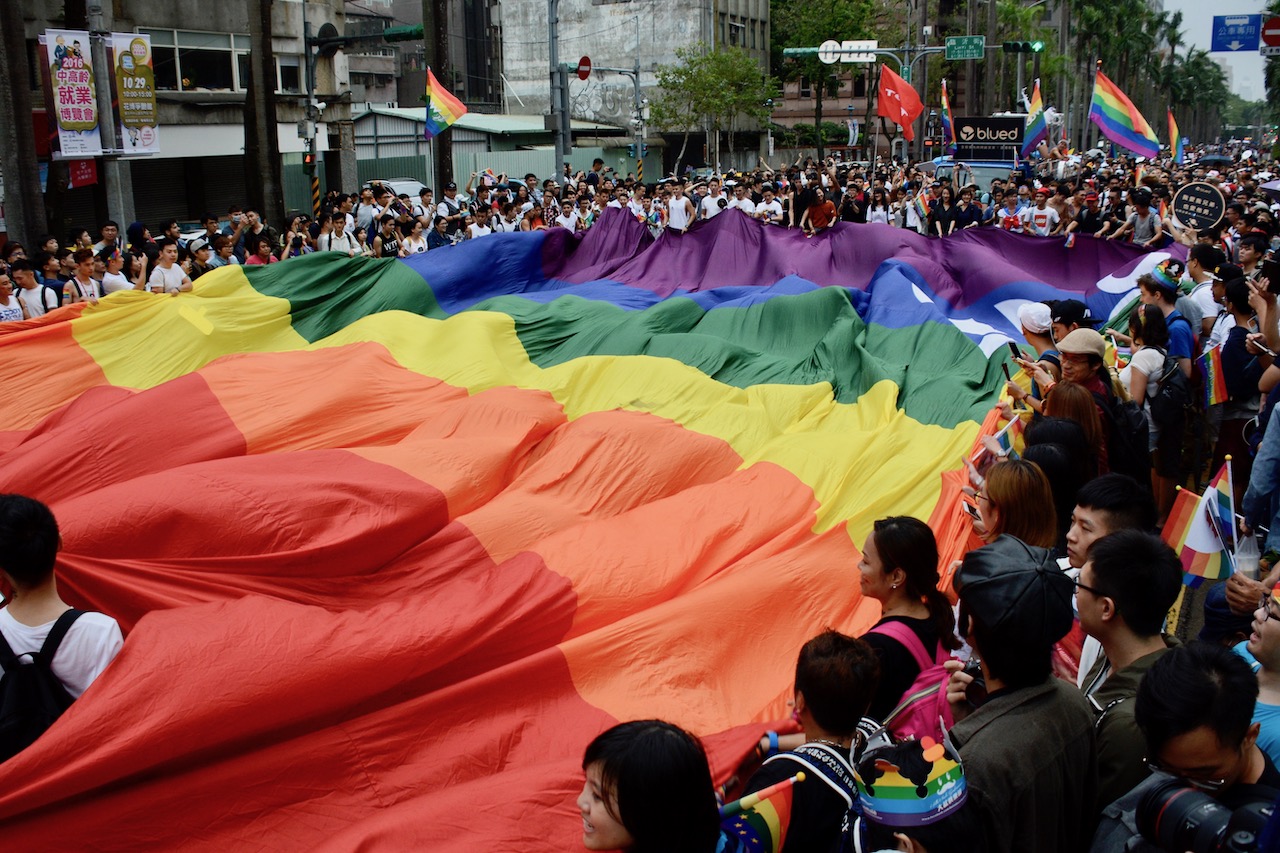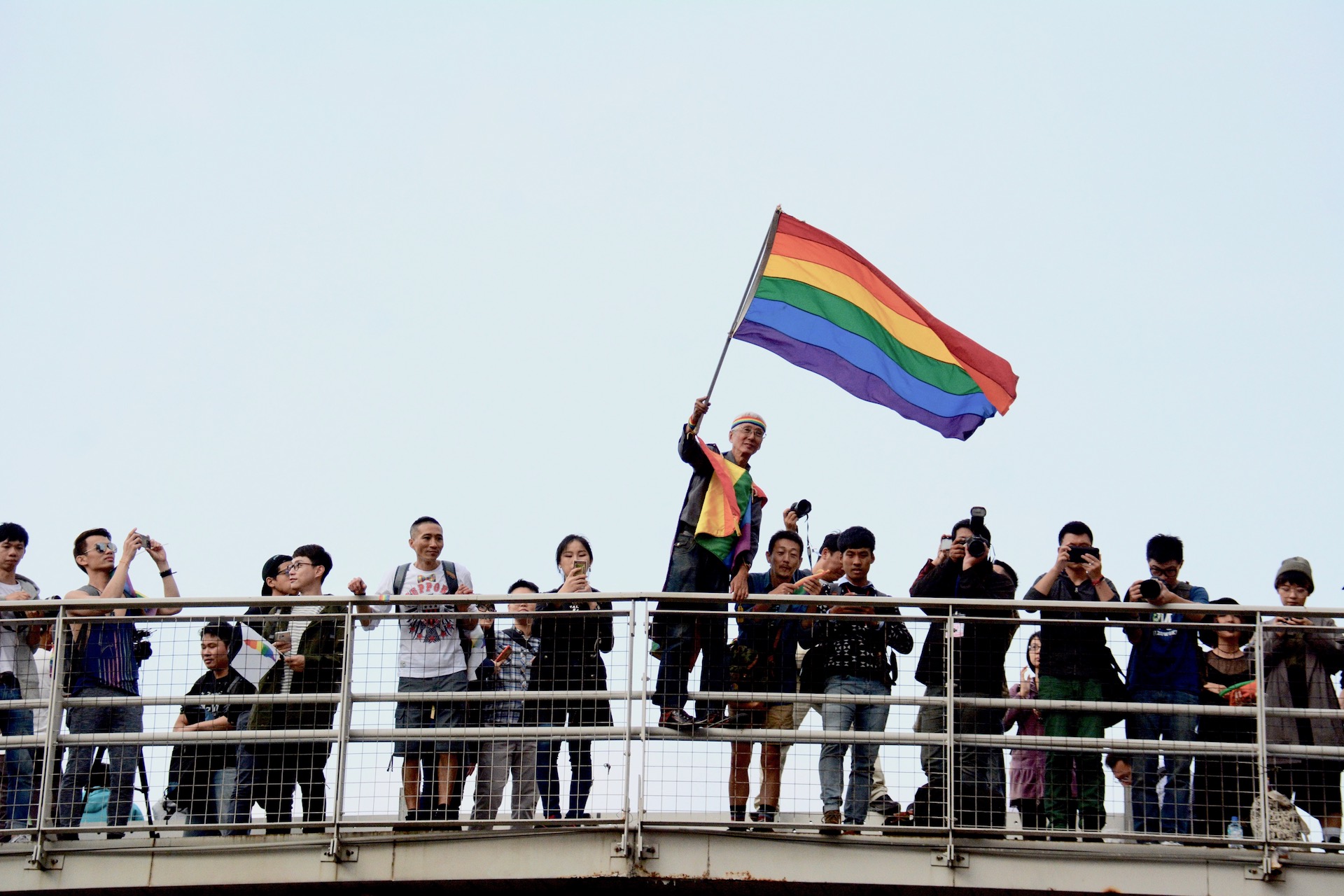Disagreement between the Executive and Legislative branches of government on the legalization of same-sex unions in Taiwan is slowing down progress on the issue and advantages opponents.
Taiwan has received a fair amount of media attention in recent months, in large part due to the famous telephone conversation between President Tsai and U.S. president-elect Trump in early December. But another development has generated quite a lot of interest as well, even among media organizations that normally would pay little heed to this island-nation. With a bill slowly climbing its way up inside the legislature, Taiwan has come to be regarded as the likeliest candidate to becoming, perhaps as early as this year, the first country in Asia to legalize same-sex marriage.
After several months — years, in fact — of battles in the trenches, members of Taiwan’s LGBTQI community and their supporters who had gathered outside the legislature had every reason to be euphoric on December 26 when the Judiciary and Organic Laws and Statutes Committee reviewed and passed a proposed amendment, initiated by Democratic Progressive Party (DPP) Legislator Yu Mei-nu, that would rephrase the contents of Article 972 of the Civil Code which stipulates that marriage can only occur between a man and a woman. In a concessionary move, committee members agreed to retain the language “between a man and a woman” while adding a clause recognizing “both parties to a same-sex marriage.”
With the proposed bill leaving the committee, Taiwan was indeed one step closer to becoming the first country in Asia to legalize same-sex unions, and expectations were high that the remainder of this long journey for the rights of homosexuals could be completed during the next legislative session, which is scheduled to start on Feb. 17. As 2016 turned into 2017, headlines in many global newspapers heralded Taiwan as the next country in line to extend full marriage rights to homosexuals.
But now there’s a problem. The Executive branch doesn’t want to hear about it.
Not a Priority
As the proposed bill made its progress at the legislature, there were signs that tensions with the Executive branch of the Tsai government were increasing. More and more, it was clear that the DPP administration, which in the lead-up to the January 2016 elections had prominently featured marriage equality in its platform, now regarded the issue as inconvenient, or the push for its realization ill-timed in the context of souring cross-Strait relations and an administration that preferred focussing on other domestic matters, such as pension reform, labor issues, and the Kuomintang’s (KMT) ill-gotten assets.
Although developments on same-sex marriage were occurring within the legislative branch, it was clear that without proactive support by the Executive, efforts to enact the proposed bill could only go so far. In fact, it could be argued that success on Dec. 26 occurred not because of government support but rather, much to the credit of the legislators involved, in spite of it.
Notwithstanding the significance of the Dec. 26 decision, the disconnect between the Executive branch and the legislature will be all the more meaningful during the current legislative session, where the fate of the proposed bill will conceivably be decided. Without a strong commitment by the Tsai government to support the effort — embodied by the caucus whip, whose unstated role is to reflect the will and wishes of the president in parliament — the necessary momentum to bring it to fruition is likely to be insufficient. And tensions between the DPP legislators who advocate for same-sex marriage and the Executive branch, not to mention legislators who remain on the fence or can conveniently hide behind the caucus whip, will increase as well.

Opponents of same-sex marriage protest outside the Presidential Office in Taipei on Dec. 26, 2016, after the legislature’s Judiciary and Organic Laws and Statutes Committee reviewed and passed a proposed amendment to the Civil Code. (Photo: J. Michael Cole)
Ironically, it is the divide within the DPP that has emboldened opponents of same-sex marriage — mainly conservative Christians and Presbyterian groups in southern parts of the country, regarded as home base for the green camp — to threaten punishment should the amendment be implemented. In the past two months or so, several of those groups have initiated or threatened recall actions against legislators who have expressed support for the legalization of same-sex marriage. In many instances, those groups were pro-DPP but nevertheless were threatening DPP legislators, including Tainan’s Wang Ding-yu.
Much of the Executive’s reluctance to moving on the same-sex marriage issue (and frustration with young party members who are growing increasingly impatient with the lack of progress) stems from the perception that opposition to legalization, particularly in the south, is high and could hurt the DPP in the polls. Whether such opposition exists is a matter of debate and no doubt contingent on how the question is framed.
Timing
Be that as it may, there is little doubt that if the government is to show leadership by proceeding with legalizing same-sex marriage, there is no better time to do so than now. Let us for a moment regard the world through the eyes of politicians and look at the issue of same-sex marriage not as an opportunity to do the right thing (enlarging the scope of human rights) but purely from an electoral perspective, which is where disgruntled citizens can punish a political party for adopting policies they disagree with. The window of opportunity to legalize same-sex marriage opened on May 20, 2016, when President Tsai was inaugurated, and will gradually close with the approach of the next major elections, which will be held in November 2018 — the municipal elections. Thus, the potential electoral costs of moving on same-sex marriage have been marginal during this period, as there were no elections approaching where disgruntled voters could take retributive action against the government. If, say, the amendment were passed in the next month or two, it is unlikely that DPP supporters would remain incensed for almost two years and still punish the DPP at the polls in November next year, not to mention that ardent pan-green supporters in the south are also unlikely, when push comes to shove, to vote against the DPP or a likeminded party.
So there is still time. But it goes without saying that the longer this drags on, the likelier it is that fears of electoral retribution will become an issue on the same-sex marriage question the closer we get to the next major elections. It can therefore be expected that opponents to same-sex marriage will do their utmost to slow down the process over the coming months until November 2018 is right around the corner. And after that, of course, there will be the general elections in January 2020 and no assurance that the government that is formed after those would be amenable, in theory, to legalizing same-sex unions. Therefore, if the Executive branch continues to drag its feet on the matter and fears taking action when the costs of doing so are at their lowest, it could be several years still before same-sex couples can see their unions recognized under the law, and by that time Taiwan might very well have been beaten by other countries in the race for leadership on human rights.
Those who oppose same-sex marriage have been extraordinarily vocal in recent months, and moreover there are indications that U.S.-based ultraconservative groups have become involved, which could complicate matters. Aware that the window of opportunity is now and that their best strategy is to buy time by stalling the process, there is every expectation that they will only become more raucous during the current legislative session. Consequently, members of Taiwan’s LGBTQI community and their supporters will have to respond in kind and be just as loud, and also promise that they will have a longer memory than their opponents when it comes to the next elections. For the longer this drags, the likelier it is that they their dreams of equality won’t be realized for many more years.
You might also like
More from Society & Culture
Media and Free Expression in Taiwan Are Under Attack: What Can be Done?
How can we avoid the imposition of a blanket silence which can only empower our enemies and damage our democracy? …
Taiwanese Views on Homosexuality Based on Proximity of Relationship, Study Shows
The legalization of same-sex marriage in Taiwan should be viewed not just as a culmination of years of advocacy efforts …
Challenges Remain Following the Legalization of Same Sex Marriage in Taiwan
Despite the adoption of a new law on May 17, campaigns will continue to legitimize the kind of homophobic discourse …









